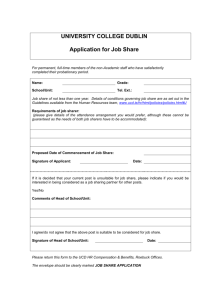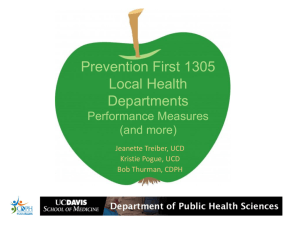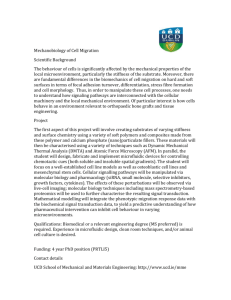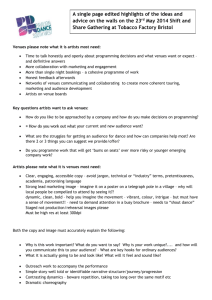Communities in Action Lifetime of Wellness Performance Measures
advertisement
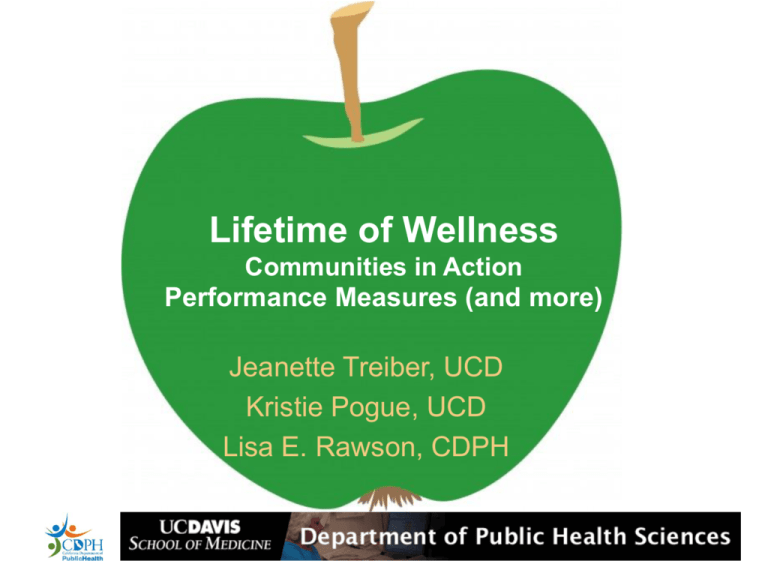
Lifetime of Wellness Communities in Action Performance Measures (and more) Jeanette Treiber, UCD Kristie Pogue, UCD Lisa E. Rawson, CDPH Agenda • • • • • • • • Welcome Context & areas addressed Performance Measures Examples of evaluation activities Overlap with 1305 Resources Q and A Post-webinar training needs conversation Counties Fresno Merced San Joaquin Shasta Solano Tulare Logic Model Areas addressed by Lifetime of Wellness Environmental factors (nutrition at venues, store food selections, transportation issues) Healthy lifestyles support (physical activity access, community walkability, lifestyle change programs) Health care systems (EHR, team based care, blood pressure self management, community health workers) Community linkages (partnerships, collaborations) Performance Measures Established by CDC Local data collection Environmental scans Component 1A: Environmental Strategies to Promote Health and Support and Reinforce Healthful Behaviors # Strategy 1.1 Implement nutrition and beverage standards including sodium standards in public institutions, worksites and other key locations such as hospitals 1.2 Strengthen healthier food access and sales in retail venues and community venues through increased availability, improved pricing, placement, and promotion 1.3 Strengthen community promotion of physical activity through signage, worksite policies, social support, and joint use agreements in communities and jurisdictions 1.4 Develop and/or implement transportation and community plans that promote walking Performance Measure 1.1 1.1 1.2 1.2 LHD’s data source/collection Number of key community locations that implement nutrition and beverage standards Number of adults who have access to key community locations that implement nutrition and beverage standards Number of retail venues in the community or jurisdiction and community venues that promote healthier food access through increased availability, and improved pricing, placement and promotion Environmental scan –UCD will assist Number of adults, who have access to retail venues and community venues that promote healthier food access Calculate population numbers by zip code Environmental scan –UCD will assist No need to collect data – your county already did with the HSHC campaign. Data available through your county’s tobacco control program or through UC Davis Performance Measure 1.3 1.3 1.4 1.4 LHD’s data source/collection Number and type of community venues that promote physical activity through signage, worksite policies and shareduse/joint use agreements Environmental scan – UCD will assist. Number of adults who have access to community venues that promote physical activity Calculate number of adults through estimates obtained from community venues Number of communities that develop and/or implement a transportation plan that promotes walking Number of adults who have access to communities that develop and/or implement plans to promote walking Information will be obtained from the Departments of Transportation/local planning boards This information will be obtained from the Departments of Transportation/local planning boards or will be calculated according to local demographic data. Component 1B: Strategies to build support for healthy lifestyles, particularly for those at high risk, to support diabetes and heart disease and stroke prevention efforts. # Strategy 1.5 Plan and execute strategic data-driven actions through a network of partners and local organizations to build support for lifestyle change 1.6 Implement evidence-based engagement strategies to build support for lifestyle change 1.7 Increase coverage for evidence-based supports for lifestyle change by working with network partners 1.5 1.5 1.6 1.7 Performance Measure LHD’s data source/collection Number of unique sectors represented in the network (e.g. employers, insurers, health systems, representatives of community organizations, food banks, and others) Annual participation/response rate of network partners in network selfassessments Network self-assessment –UCD will develop a survey you can use Number of people reached through evidence-based engagement strategies UCD will help you calculate this number Number of employees with prediabetes or at high risk for type 2 diabetes who have access to evidence-based lifestyle change programs as a covered benefit UCD will assist in helping you access or calculate LHD numbers Network self-assessment-UCD will develop a survey you can use Overlap with Prevention First 1305 LHDs Area EHRs/treatment Self-management plans Adherence to medications High Blood Pressure Multidisciplinary approach Self-management encouragement Self-management CDC recognized lifestyle program referral Diabetes CHW referral CHW delivering edu Pharmacists/self-management Resources UC Davis website (currently under Center for Program Evaluation and Research; soon its own website): www.programeval.ucdavis.edu; look under “other projects” TA and Training Phone and e-mail contact: Jeanette Treiber jtreiber@ucdavis.edu 530-752-9955 Kristie Pogue krpogue@ucdavis.edu Phone: tbd General phone line 530-752-9951 Training Needs Assessment


